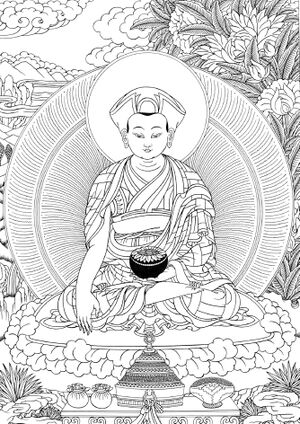No edit summary |
No edit summary |
||
| Line 9: | Line 9: | ||
༡) བྱང་སེམས་ཕྱག་ཆེན། | ༡) བྱང་སེམས་ཕྱག་ཆེན། | ||
བྱམས་དང་སྙིང་རྗེའི་རྟ་ཕོ་ལ། །གཞན་ཕན་གི་དཀྱུས་ཐོག་མ་བཅད་ན། །ཁྲོམ་ལྷ་མིའི་འོར་ཆེ་མི་འབྱུང་བས། །སེམས་སྔོན་འགྲོ་འདི་ལ་ནན་ཏན་མཛོད།། | བྱམས་དང་སྙིང་རྗེའི་རྟ་ཕོ་ལ། །གཞན་ཕན་གི་དཀྱུས་ཐོག་མ་བཅད་ན། །ཁྲོམ་ལྷ་མིའི་འོར་ཆེ་མི་འབྱུང་བས། །སེམས་སྔོན་འགྲོ་འདི་ལ་ནན་ཏན་མཛོད།། | ||
| Line 19: | Line 20: | ||
༢) ཡི་དམ་ལྷ་སྐུའི་ཕྱག་ཆེན། | ༢) ཡི་དམ་ལྷ་སྐུའི་ཕྱག་ཆེན། | ||
རང་ལུས་ལྷ་སྐུའི་རྒྱལ་པོ་ལ། །གཞི་འགྱུར་མེད་ཀྱི་བརྟན་ས་མ་ཟིན་ན། །མ་མཁའ་འགྲོའི་འཁོར་འབངས་མི་འདུ་བས། །ལུས་ཡི་དམ་གི་ལྷ་ལ་ནན་ཏན་མཛོད།། | རང་ལུས་ལྷ་སྐུའི་རྒྱལ་པོ་ལ། །གཞི་འགྱུར་མེད་ཀྱི་བརྟན་ས་མ་ཟིན་ན། །མ་མཁའ་འགྲོའི་འཁོར་འབངས་མི་འདུ་བས། །ལུས་ཡི་དམ་གི་ལྷ་ལ་ནན་ཏན་མཛོད།། | ||
| Line 29: | Line 31: | ||
༣) བླ་མའི་མོས་གུས་ཕྱག་ཆེན། | ༣) བླ་མའི་མོས་གུས་ཕྱག་ཆེན། | ||
བླ་མ་སྐུ་བཞིའི་གངས་རི་ལ། །མོས་གུས་ཀྱི་ཉི་མ་མ་ཤར་ན། །བྱིན་རླབས་ཀྱི་ཆུ་རྒྱུན་མི་འབྱུང་བས། །སེམས་་མོས་གུས་འདི་ལ་ནན་ཏན་མཛོད།། | བླ་མ་སྐུ་བཞིའི་གངས་རི་ལ། །མོས་གུས་ཀྱི་ཉི་མ་མ་ཤར་ན། །བྱིན་རླབས་ཀྱི་ཆུ་རྒྱུན་མི་འབྱུང་བས། །སེམས་་མོས་གུས་འདི་ལ་ནན་ཏན་མཛོད།། | ||
| Line 39: | Line 42: | ||
༤) གནས་ལུགས་ཕྱག་ཆེན། | ༤) གནས་ལུགས་ཕྱག་ཆེན། | ||
སེམས་ཉིད་ཀྱི་ནམ་མཁའ་ཡངས་པ་ལ། །རྣམ་རྟོག་གི་སྤྲིན་ཚོགས་མ་དེངས་ན། །མཁྱེན་གཉིས་ཀྱི་གཟའ་སྐར་མི་བཀྲ་བས། །སེམས་མི་རྟོག་འདི་ལ་ནན་ཏན་མཛོད།། | སེམས་ཉིད་ཀྱི་ནམ་མཁའ་ཡངས་པ་ལ། །རྣམ་རྟོག་གི་སྤྲིན་ཚོགས་མ་དེངས་ན། །མཁྱེན་གཉིས་ཀྱི་གཟའ་སྐར་མི་བཀྲ་བས། །སེམས་མི་རྟོག་འདི་ལ་ནན་ཏན་མཛོད།། | ||
| Line 49: | Line 53: | ||
༥) བསྔོ་བ་ཕྱག་ཆེན། | ༥) བསྔོ་བ་ཕྱག་ཆེན། | ||
ཚོགས་གཉིས་ཡིད་བཞིན་གྱི་ནོར་བུ་ལ། །སྨོན་ལམ་གྱིས་བྱི་དོར་མ་བྱས་ན། །དགོས་འདོད་ཀྱི་འབྲས་བུ་མི་འབྱུང་བས། །རྗེས་བསྔོ་བ་འདི་ལ་ནན་ཏན་མཛོད།། | ཚོགས་གཉིས་ཡིད་བཞིན་གྱི་ནོར་བུ་ལ། །སྨོན་ལམ་གྱིས་བྱི་དོར་མ་བྱས་ན། །དགོས་འདོད་ཀྱི་འབྲས་བུ་མི་འབྱུང་བས། །རྗེས་བསྔོ་བ་འདི་ལ་ནན་ཏན་མཛོད།། | ||
Revision as of 13:25, 2 December 2021
Jikten Sumgön's Fivefold Path of Mahāmudrā[edit]
Jikten Sumgön, the founder of the Drikung Kagyu tradition, presented Mahāmudrā practice in five parts in his short poetic work called Hymns on the Fivefold Path of Realization (ལྔ་ལྡན་རྟོགས་པའི་མགུར།). Capturing an important topic in each verse and using an effective analogy for each topic, his poetic work has become a well-known, concise text on Mahāmudrā and is widely cited in the later works. The five verses with translation by Khenchen Konchog Gyaltsen of the Drikung lineage are given below.
༡) བྱང་སེམས་ཕྱག་ཆེན།
བྱམས་དང་སྙིང་རྗེའི་རྟ་ཕོ་ལ། །གཞན་ཕན་གི་དཀྱུས་ཐོག་མ་བཅད་ན། །ཁྲོམ་ལྷ་མིའི་འོར་ཆེ་མི་འབྱུང་བས། །སེམས་སྔོན་འགྲོ་འདི་ལ་ནན་ཏན་མཛོད།།
1. The Great Seal of Bodhichitta
If the steed of love and compassion
Does not run for the benefit of others,
It will not be rewarded in the assembly of gods and humans.
Attend, therefore, to the preliminaries.
༢) ཡི་དམ་ལྷ་སྐུའི་ཕྱག་ཆེན།
རང་ལུས་ལྷ་སྐུའི་རྒྱལ་པོ་ལ། །གཞི་འགྱུར་མེད་ཀྱི་བརྟན་ས་མ་ཟིན་ན། །མ་མཁའ་འགྲོའི་འཁོར་འབངས་མི་འདུ་བས། །ལུས་ཡི་དམ་གི་ལྷ་ལ་ནན་ཏན་མཛོད།།
2. The Great Seal of Yidam Deity
If one’s body, the King of Deities
Is not stabilized on this Unchanging Ground,
The retinue of dakinis will not assemble.
Be sure, therefore, of your body as the yidam.
༣) བླ་མའི་མོས་གུས་ཕྱག་ཆེན།
བླ་མ་སྐུ་བཞིའི་གངས་རི་ལ། །མོས་གུས་ཀྱི་ཉི་མ་མ་ཤར་ན། །བྱིན་རླབས་ཀྱི་ཆུ་རྒྱུན་མི་འབྱུང་བས། །སེམས་་མོས་གུས་འདི་ལ་ནན་ཏན་མཛོད།།
3) The Great Seal of Devotion
If on the Guru, the Snow Mountain of the Four Kayas,
The Sun of Devotion fails to shine,
The Stream of Blessings will not flow.
Attend, therefore, to this mind of devotion.
༤) གནས་ལུགས་ཕྱག་ཆེན།
སེམས་ཉིད་ཀྱི་ནམ་མཁའ་ཡངས་པ་ལ། །རྣམ་རྟོག་གི་སྤྲིན་ཚོགས་མ་དེངས་ན། །མཁྱེན་གཉིས་ཀྱི་གཟའ་སྐར་མི་བཀྲ་བས། །སེམས་མི་རྟོག་འདི་ལ་ནན་ཏན་མཛོད།།
4. The Great Seal of the True Nature
If in the vastly spacious space of the mind itself (cittata)
The clouds of conceptual thoughts do not dissipate,
The stars and the planets of the Dual Knowledge་will not shine.
Attend, therefore, to nonconceptuality.
༥) བསྔོ་བ་ཕྱག་ཆེན།
ཚོགས་གཉིས་ཡིད་བཞིན་གྱི་ནོར་བུ་ལ། །སྨོན་ལམ་གྱིས་བྱི་དོར་མ་བྱས་ན། །དགོས་འདོད་ཀྱི་འབྲས་བུ་མི་འབྱུང་བས། །རྗེས་བསྔོ་བ་འདི་ལ་ནན་ཏན་མཛོད།།
5. The Great Seal of Dedication
If the two wish-fulfilling gems of Accumulations
Are not cleaned and polished with aspiration prayers,
The results of (your) hopes and expectations will not come to fruition.
Attend, therefore, to the dedication of merits at the end.
Weekly quote[edit]
~

